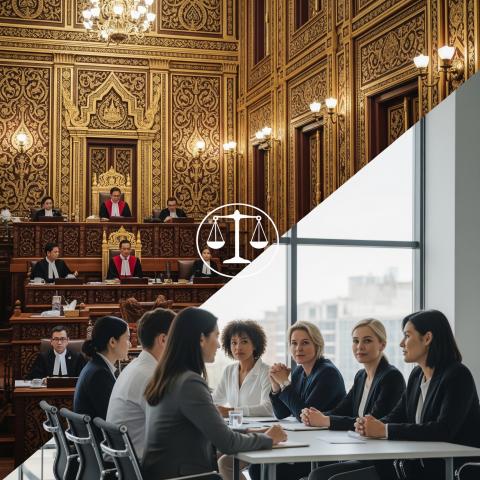Navigating Bankruptcy in Thailand: Legal Guidance for Foreigners | PS Law & Business
Facing financial distress in Thailand? Understand bankruptcy proceedings, creditor/debtor rights, and restructuring options with our expert legal support for foreigners.
Bankruptcy in Thailand is a legal process governed by the Bankruptcy Act B.E. 2483 (1940) and its amendments. It provides a framework for managing the assets of an insolvent debtor and distributing them fairly among creditors. For foreigners and foreign-owned businesses operating in Thailand, understanding this process is crucial when facing financial difficulties.
Initiating Bankruptcy Proceedings
Unlike some jurisdictions, a debtor cannot voluntarily file for bankruptcy in Thailand. Bankruptcy proceedings are initiated by a creditor filing a petition with the Central Bankruptcy Court. For a creditor to successfully file for bankruptcy against a debtor, certain conditions must be met:
- Insolvency: The debtor must be proven insolvent, meaning their assets are insufficient to cover their liabilities.
- Minimum Debt Threshold:
- For an individual debtor, the debt owed to one or more petitioning creditors must be at least THB 1 million.
- For a juristic person (e.g., a company), the debt owed must be at least THB 2 million.
The Bankruptcy Act also outlines circumstances under which a debtor is presumed insolvent, such as failing to make repayments after receiving two demand notices from a creditor with a 30-day interval.
The Bankruptcy Process Overview
Once a bankruptcy petition is filed and accepted by the court, the typical process involves several key stages:
- Receivership Order: The court may initially issue a temporary receivership order to protect the debtor's assets. If the grounds for bankruptcy are established, an absolute receivership order is issued. An Official Receiver is appointed by the Legal Execution Department to manage the debtor's assets and affairs.
- Creditors' Meeting: The Official Receiver will call a meeting of creditors to inform them of the debtor's situation, examine claims, and potentially discuss a debt composition plan if proposed by the debtor.
- Adjudication of Bankruptcy: If a debt composition plan is not proposed or not approved by the creditors, the court will adjudge the debtor bankrupt.
- Asset Liquidation and Distribution: The Official Receiver will liquidate the bankrupt's assets and distribute the proceeds to creditors according to their legal priority.
- Discharge from Bankruptcy: For individual debtors, they are generally automatically discharged from bankruptcy three years after the date of the bankruptcy adjudication, provided there has been no dishonesty or non-cooperation during the process. For juristic persons, the entity will eventually be dissolved.
Implications for Foreigners
Foreigners involved in bankruptcy proceedings in Thailand, whether as debtors or creditors, face specific considerations:
- Jurisdiction: Thai bankruptcy law applies to debtors domiciled or conducting business in Thailand. Foreign bankruptcy proceedings generally do not have an automatic effect on a debtor's assets located in Thailand.
- Language and Legal System: All court proceedings and official documents will be in Thai. Foreigners will require proficient legal translation and representation from lawyers familiar with the Thai legal system.
- Restrictions during Bankruptcy: A person adjudged bankrupt faces certain restrictions, such as limitations on managing property, holding certain directorships, and potentially travel restrictions.
- Cross-Border Insolvency: Thailand has specific provisions regarding the recognition of foreign bankruptcy proceedings and cooperation with foreign representatives, though these can be complex.
Business Reorganization
For businesses facing financial distress but with a viable prospect of recovery, an alternative to straightforward bankruptcy is business reorganization under the Bankruptcy Act. This process, similar to Chapter 11 in the United States, allows a company to restructure its debts and operations under court supervision with the aim of returning to profitability. A petition for business reorganization can be filed by the debtor, a creditor, or relevant government agencies if the debt is at least THB 10 million for a juristic person.
How PS Law & Business Can Assist
Navigating bankruptcy or insolvency in Thailand can be complex, particularly for foreigners. PS Law & Business offers comprehensive legal services for both debtors and creditors, including:
- Advising on the intricacies of Thai bankruptcy law and its implications for foreigners.
- Assisting creditors in filing bankruptcy petitions and recovering debts.
- Representing debtors in bankruptcy proceedings and negotiating with creditors.
- Guiding businesses through the business reorganization process.
- Providing representation in the Central Bankruptcy Court.
- Liaising with the Official Receiver and other relevant authorities.
Our team of experienced lawyers understands the challenges faced by English-speaking clients and is dedicated to providing clear, practical, and effective legal solutions in matters of insolvency and bankruptcy.
FAQ Section
Q1: Can I voluntarily declare bankruptcy in Thailand as an individual?
A1: No, under Thai law, a debtor cannot voluntarily file for bankruptcy. Proceedings must be initiated by a creditor.
Q2: What is the minimum amount of debt required for a creditor to file for bankruptcy against a business in Thailand?
A2: For a juristic person (company), a creditor can file for bankruptcy if the debt is at least THB 2 million and the company is insolvent.
Q3: How long does the bankruptcy status last for an individual in Thailand?
A3: Generally, an individual is automatically discharged from bankruptcy three years after being adjudged bankrupt, assuming cooperation and no fraudulent activity.
Q4: As a foreigner, will my overseas assets be affected by Thai bankruptcy proceedings?
A4: Thai bankruptcy proceedings primarily concern assets within Thailand. However, the extent to which overseas assets may be affected can depend on international treaties and the laws of the jurisdiction where those assets are located. It's a complex area requiring specific legal advice.
Q5: What is business reorganization in Thailand?
A5: Business reorganization is a court-supervised process allowing a financially distressed company with viable recovery prospects to restructure its debts and operations to become profitable again. It is an alternative to liquidation through bankruptcy.
Q6: Do I need a Thai lawyer for bankruptcy proceedings?
A6: Yes, it is highly recommended. All court proceedings are in Thai, and navigating the legal system requires expertise in Thai bankruptcy law. PS Law & Business can provide English-speaking legal representation.
External Links Section
- Legal Execution Department Thailand: Provides information on bankruptcy procedures and the role of the Official Receiver (Note: English content may be limited).
- Bank of Thailand: Offers economic data and regulations that may be relevant contextually.
- The Judiciary of Thailand: Provides general information about the Thai court system, including the Central Bankruptcy Court.










